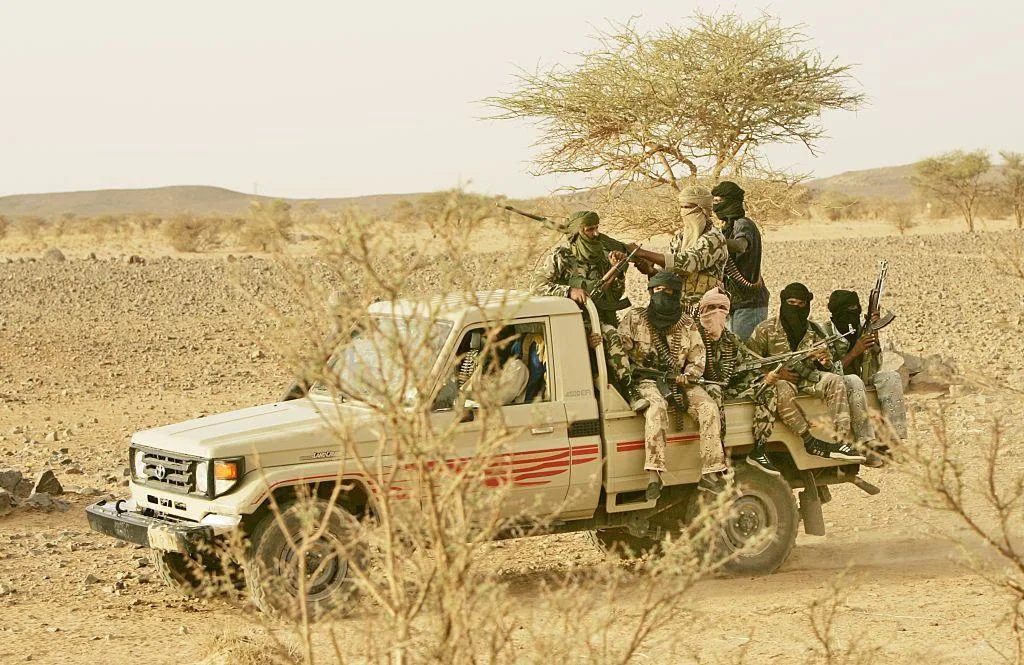Mali is facing a deepening crisis as Islamist militants escalate a blockade on key highways, threatening fuel supplies, regional trade, and the stability of the landlocked West African nation. The attacks, marked by ambushes, arson, kidnappings, and the extortion of traders, have sparked fear across the country and raised alarms among regional partners who depend on Mali for commerce.
Prime Minister Abdoulaye Maïga recently acknowledged the gravity of the situation, admitting that the government is working to strengthen security along vital routes. The rare statement reflects the severity of the threat as militants aligned with al-Qaeda’s Sahel affiliate, Jama’at Nusrat al-Islam wal-Muslimin (JNIM), step up efforts to isolate the capital Bamako through what analysts describe as a campaign of “economic asphyxiation.”
The blockade began in early September after the kidnapping and release of six Senegalese lorry drivers on the Dakar-Bamako corridor. Since then, the militants have widened their operations, targeting Kayes and Nioro-du-Sahel two strategic hubs that serve as Mali’s gateway to Senegal and Mauritania. Reports indicate that armed fighters have established checkpoints, torched buses, fuel tankers, and cargo trucks, abducted drivers, and extorted illegal “taxes” from traders transporting goods.
The consequences have been devastating for local communities. Entire villages have been economically paralyzed, with markets closed, transport halted, and public services disrupted. In southern Mali’s Bougouni area, suspected JNIM militants attacked convoys carrying fuel imports from Ivory Coast, torching several lorries and intensifying fears of a nationwide supply crisis. While Bamako has not yet faced an outright shortage, fuel prices have risen by about 10%, electricity blackouts have become more frequent, and transport companies have suspended operations due to safety concerns.
Malian authorities initially sought to downplay the crisis. Army spokesman Colonel Souleymane Dembélé dismissed claims of a blockade as “an information war orchestrated by foreign media” and insisted that disruptions were caused by seasonal rains rather than militant activity. However, as video evidence of burning buses and stranded convoys circulated on social media, the government launched airstrikes on JNIM camps, deployed reinforcements to Kayes and Nioro-du-Sahel, and announced large-scale offensives along the Diéma-Nioro corridor. Despite these efforts, residents say militant checkpoints remain in place, and drivers continue to face intimidation on highways that are vital to Mali’s economy.
Kayes is particularly significant, accounting for around 80% of Mali’s gold production and serving as the main trade corridor to Senegal. As a logistics hub, control of Kayes is crucial not only for domestic stability but also for maintaining regional supply chains. Disruptions to this corridor directly threaten Mali’s economic lifeline and risk undermining confidence in the country’s transitional government. Analysts at the Timbuktu Institute in Dakar describe Kayes as a “major strategic target” for jihadists, who aim to destabilize Mali, suffocate its economy, and increase pressure on the ruling junta.
The blockade also represents a geographic shift in JNIM’s insurgency. Historically concentrated in northern and central regions such as Mopti, Segou, and Timbuktu, the group has steadily expanded southward into Sikasso and Koulikoro, and now westward into Kayes. By targeting these regions, the militants are not only broadening their footprint but also threatening to encircle Bamako, potentially isolating the capital from critical supply routes.
The crisis has regional implications as well. Mali is Senegal’s largest African trade partner, with commerce valued at more than $1.4 billion in 2024. The Dakar-Bamako highway carries vital goods such as fuel, cement, foodstuffs, and manufactured products. The Union of Senegalese Truckers has condemned the abductions and attacks, warning that militant activity on Mali’s trade routes could undermine regional stability and disrupt cross-border commerce.
Since 2012, Mali has battled a worsening insurgency fueled by al-Qaeda and Islamic State affiliates, as well as armed militias. Despite military offensives supported by Russian Africa Corps mercenaries, formerly known as the Wagner Group, the state has struggled to secure territory or protect its citizens. Analysts warn that JNIM’s shift from open combat to economic disruption demonstrates a sophisticated strategy designed to weaken state institutions without direct confrontation.
By targeting buses, lorries, and tankers the backbone of Mali’s social and economic mobility the militants are attacking the everyday life of the country while projecting power beyond its borders. Observers fear that the isolation of Kayes and Nioro-du-Sahel could become a blueprint for similar sieges in neighboring countries, further destabilizing the already volatile Sahel region, which accounts for more than half of global terrorism-related deaths.
The blockade of Mali’s highways is more than a local security flare-up it is a warning sign that the jihadist insurgency has entered a new phase. If left unchecked, the economic sabotage could spiral into a prolonged siege, crippling trade, isolating Bamako, and destabilizing not just Mali but the wider West African region.













Leave a comment